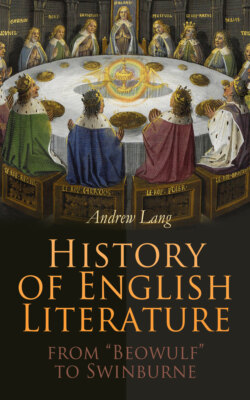Читать книгу History of English Literature from "Beowulf" to Swinburne - Andrew Lang, Robert Kirk - Страница 12
На сайте Литреса книга снята с продажи.
Waldhere.
ОглавлениеOf this poem only some sixty lines exist. They were found at Copenhagen, written on two pieces of vellum which had been used in binding a book: it is common to find fragments of early printed books or manuscripts in the bindings of books more recent. One page of "Waldhere" contains a speech by the heroine of the tale, Hildeguthe, urging Waldhere to fight Guthere; the other fragment has portions of a dialogue between the two combatants.
The names of the personages show that the poem was one of which we have other versions, the most intelligible is a Latin form in verse.4 The story deals with an adventure, real or romantic, in the wars of Attila with the Franks. Waldhere, an Aquitanian hostage, brought up in Attila's court, with his betrothed lady, Hildeguthe, daughter of the King of the Burgundians, is now keeper of Attila's treasures; he and his friend Hagen escape; Hagen, who first fled, reached the court of Guthere, King of the Franks, and hearing there that a lady and a knight, with a treasure, are wandering about, he recognizes his friends, and follows them with King Guthere (who mainly wants the treasure), and with eleven other warriors. Hildeguthe sees them coming, and Waldhere, who will not give up the treasures, slays the eleven companions of Guthere, who are chivalrous enough to "set him man for man," as the Scottish ballad says, in place of overpowering him by numbers. Hagen, of course, does not want to fight his friend Waldhere, but Fate, the Anglo-Saxon Wyrd, is too strong: Waldhere has to encounter both Guthere and Hagen, for Hagen is Guthere's man, or thegn, and may not disobey him; moreover, he must avenge his nephew, whom Waldhere has already slain. All three men receive terrible wounds, and then they make friends; and Waldhere keeps both his lady and the treasure.
This version of the story is more like a later romance than the other Germanic epics. In these, as in this tale, there is usually a tragic conflict of passions and duties, as when the law of blood-vengeance compels a woman to avenge a slain father or brother, or her husband or her lover. The end is always tragic, but the Latin poet has probably contrived "a happy ending," while retaining the many good fights, and the conflict of friendship and duty to a hero's lord, which make the interest of the story.
In the Anglo-Saxon fragments, Hildeguthe, encouraging, her lover to fight, praises the swordsmith, the old German hero, Weland, the Tubal Cain of the race. He made the sword Miming, the best of all swords, which never fails the fighter. Hildeguthe has never seen Waldhere flee the fight; now he must not be less noble than himself. The other fragment is like the dialogues of the heroes in the Iliad before they come to blows.
The whole of "Waldhere" must have been, when complete, a poem much more complex, and even more interesting (at least to modern readers) than "Beowulf". It had "love interest," a brave heroine, good duels, and the tragic conflict of duties, while it was full of allusions to other ancient epics of the Germanic peoples.
